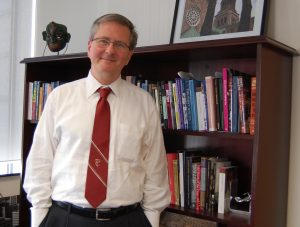
The Concordian sat down with Concordia President Alan Shepard to look back on the semester and discuss moving forward in the new year.
The Concordian: Has the university made any more efforts to contact Chinese students who have had negative experiences with Concordia’s foreign recruitment program?
A.S. We have been working with Chinese Family Services and we’re just about to go out and make contact with the students. We’ll be reaching out to the students who came through the China Recruitment program; there’s about 400 of those students this year. What we really want to ensure is that they are feeling safe, well looked after, that their circumstances are acceptable to them and they are having a good experience. If they are in any kind of distress, then they will be able to report that and we will hear back from Chinese Family Services. We will be getting feedback as soon as they have conducted those interviews.
Concordian: If Concordia does decide to bring foreign student recruitment in-house, what would that look like?
A.S. We’re getting pretty close to making a decision. Our choices are to continue to use a foreign recruiter, or build an Asia recruitment team inside our recruitment team. We’d probably have to add to staff and we want to make sure that we get people who have the language capabilities to recruit in Mandarin. We will be working on that right away if we go in that direction. [The decision] will be made by President’s Executive Group, on recommendation from Roger Côté.
Concordian: Why is bicameralism between the university Board of Governors and Senate so important to a university structure?
A.S. Universities, we’re not fundamentally businesses, we’re fundamentally societies or communities of people pursuing a common mission. We have a business element. I mean, we can’t be foolish with the funds. They’re taxpayer dollars, they’re student tuition dollars and they are gifts to the university. So you need to be scrupulously careful about what you do with the money. But beyond that we’re a society or community … and a key voice in that is the Senate, composed of student staff and faculty who are leaders in the academic community, so they need to have a voice. Particularly on academic matters.
Concordian: Have any other measures been put into place to facilitate bicameralism?
A.S. I think what you’re going to see now is the action, the practice of it. We’ve put all the framework in place and now what you want to be watching for is ultimately, ‘is it really happening?’. On both sides [there is] a willingness to work together and I’m certainly interested in bicameralism. The legislative pieces are done and it’s actually taking root. That’s good because you get a stronger, healthier university.
Concordian: Do you have a specific goal for the upcoming education summit?
A.S. I have a general goal which is that I want to ensure that the university’s voices are heard. I think there’s often a lot of confusion about what universities’ missions are, how they work, how they’re funded and so forth, so clarity is really good. Because I think we have nothing to hide … and I’m really interested in the mission getting through to the general public. It’s important that the people of Quebec understand that universities serve Quebec. We serve students, but we also serve the prosperity of Quebec; social, cultural and economic.
Concordian: After your first semester at Concordia, what have you learned?
A.S. So when you are being recruited for a job like this, you have some sense of what the job will be like, but it’s hard to have a really close sense. You can talk to people, you can read, but I think the key thing that I’ve learned is what a strong and fantastic place it is. And I mean that quite sincerely. I have visited many research centres on campus, I have talked to many students, many alumni, faculty, staff and people in the larger Quebec society. It’s a big, complex place, but it’s got enormous potential. I’ve made it my work in this first semester to get to know the people and the place and I feel like I’ve succeeded in doing that.
Concordian: What do you hope to accomplish next semester?
A.S. I want to dive deeply into the university’s academic plan and its structural framework and I want for the team to continue to push forward on new initiatives and ongoing ones. I’m working with the team, focusing closely on data; we have a lot of data on how the place works and … in areas where things are going well I want to continue to support those—and in areas where we need to make changes, if the data suggests that, then I want to start making those changes.
I also want to make sure that I’m representing Concordia externally. So one of my jobs is to be talking to friends of the university, talking to governments, talking to prospective donors, talking to prospective students, so I want to be out there working on Concordia’s reputation.




